American Academy of Arts and Sciences Luigi Rizzi Boston
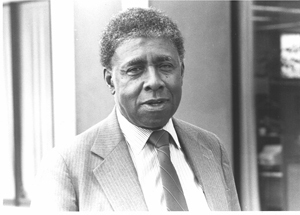
Harold Amos, from Memorial Minutes, Harvard University
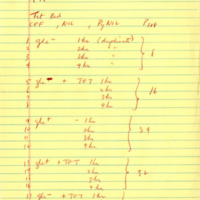
Research notes related to experiments on Tetrazolium equally part of Amos'due south laboratory research, 1978 November.
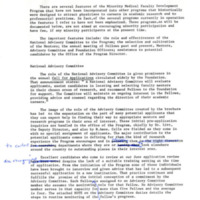
Excerpt from a written report on the Robert Wood Johnson Minority Medical Faculty Evolution Program, of which Amos was the Program Director, reflecting his long involvement in educational equality, 1990 October.
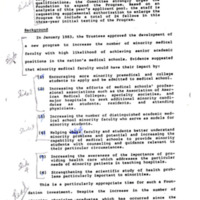
Excerpt from a talk given by Amos about the origins of the Robert Wood Johnson Minority Medical Faculty Development Programme, 1998 September.
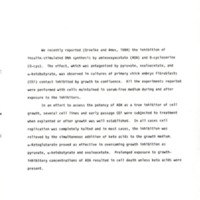
Description of experiments carried out by Amos and Groelke regarding the inhibition of insulin-stimulated DNA synthesis by aminooxyacetate (AOA) and D-cycloserine, from typhoon of paper "Inhibition of Prison cell Growth past Aminooxyacetate: Greater Sensitivity of Transformed Fibroblasts" by Amos, 1985 April.
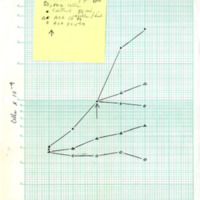
Graph based on Amos'south experiments with aminooxyacetate (AOA) and Nil hamster fibroblasts, 1985.
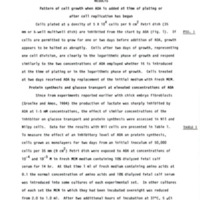
Draft of results department from a paper based on Amos's enquiry with Harvard Medical Schoolhouse colleague Kenneth Grand. Mandel entitled "The office of extracellular hydrolysis of NAD+ in its apparent accumulation of cultured Nil hamster fibroblasts" (NAD+ stands for nicotinamide adenine dinucleotide), 1985 March 01.
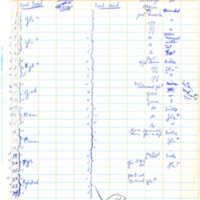
Research notes from Amos's Tetrazolium experiments, 1978 March xviii.
Harold Amos (1918-2003), Pennsauken, New Jersey, was the Maude and Lillian Presley Professor of Microbiology and Molecular Genetics, besides as the Chair, Department of Microbiology and Molecular Genetics and Chair, Partitioning of Medical Sciences, Harvard Medical Schoolhouse, Boston, Massachusetts. He was the start African American doctoral graduate of the Division of Medical Sciences, Harvard Medical School, in 1952, and the first African American to serve as a Chair of a department at Harvard Medical School. Amos is known for his research into bacterial metabolism and animal and bacterial virology, including the use of bacterial RNA to program higher prison cell poly peptide synthesis, enzyme inductions, insulin, serum, temperature furnishings, ribosomes, phosphoproteins, RNA metabolism, equally well as glucose starvation and glycerol and hexose metabolism.
Harold Amos was born September 7, 1918, in Pennsauken, New Jersey, the second of nine children of Howard R. Amos, Sr. and Iola Johnson. He graduated beginning in his form from Camden High School in New Jersey in 1936, and completed his undergraduate studies at Springfield College, Springfield, Massachusetts, graduating summa cum laude in 1941 with a major in Biology and minor in Chemical science. Amos was a graduate assistant in the Biological science Department, Springfield College, until he was drafted into the Quartermaster Corps of the United States Army (1942). He served during World State of war 2 as a warrant officeholder in a battalion that supplied gasoline to troops; he spent 2 years in England before serving in French republic and onetime Czechoslovakia until his belch (1946).
Amos enrolled in the Biological Sciences' graduate program in the Division of Medical Sciences, Harvard Medical School, in 1946, and completed his Master's degree in 1947. He became the start African American to earn a doctoral degree from the Division of Medical Sciences, Harvard Medical Schoolhouse, in 1952. Amos received a Fulbright fellowship and worked in the laboratory of Georges Cohen at the Institut Pasteur in Paris, French republic, working with the threonine mutants of Escherichia coli (1951-1952). Amos then returned to Harvard Medical School in 1954 as an Teacher, Department of Bacteriology and Immunology. He advanced to the position of full Professor in 1969. He was the get-go African American to head a section at Harvard Medical School when he became the Chair, Department of Microbiology and Molecular Genetics, a office he held from 1968-1971 and again from 1975-1978. He also served as the Chair, Division of Medical Sciences, two times (1971-1975, 1978-1988). In 1975, he became the Maude and Lillian Presley Professor of Microbiology and Molecular Genetics, and held this office until he became a Professor Emeritus in 1988. Afterwards his retirement, he became an active member of the Minority Medical Faculty Development Program Advisory Commission of the Robert Wood Johnson Foundation, and continued to work in the laboratory of Jack Murphy at Boston University up until his decease.
Much of Amos's inquiry focuses on bacterial metabolism and creature and bacterial virology, though his initial focus was on Escherichia coli and its phages, including the 1958 finding of 5-methylcytosine in Escherichia coli, which was only confirmed decades after. During his time at Harvard Medical School, Amos studied the use of bacterial RNA to program higher prison cell poly peptide synthesis, enzyme inductions, insulin, serum, temperature effects, ribosomes, phosphoproteins, RNA metabolism, as well as glucose starvation and glycerol and hexose metabolism.
Amos was professionally active in many ways, especially those focused on minority students and faculty members. He was on the Board of Directors, Josiah Macy Jr. Foundation, and on the Minority Medical Kinesthesia Development Program Advisory Commission, Robert Wood Johnson Foundation. He was on the National Cancer Society Advisory Lath and the President's Cancel Panel. He was a President of the Massachusetts Division, American Cancer Social club, and a lifetime delegate to the National American Cancer Society Assembly, the volunteer governing trunk of the American Cancer Society. Throughout his career, Amos was an advocate for National Institutes of Health and the Federation of American Society for Experimental Biology programs for minority college students.
For his scholarly work, Amos received numerous awards. He received the Honoris Causa doctoral Degree, Harvard Academy (1996), and the Centennial Medal of the Harvard Graduate Schoolhouse of Arts and Sciences (2000). Amos was awarded the get-go Charles Drew World Medical Prize from Howard University (1989), and received the Public Welfare Medal from the National Academy of Sciences (1995). He was elected to the American Academy of Arts and Sciences (1974) and was a Fellow of the American Association for the Advocacy of Scientific discipline (1991) and the Found of Medicine, National Academy of Sciences (1991). Additionally, Amos received the showtime annual Harold Amos Faculty Diversity Laurels for his contributions to diversity efforts at Harvard Medical School.
The items displayed below both demonstrate both Amos'south scientific research and his advocacy for minority teaching and kinesthesia evolution.
Source: https://collections.countway.harvard.edu/onview/exhibits/show/maximizingmicrobiology/amos
0 Response to "American Academy of Arts and Sciences Luigi Rizzi Boston"
Post a Comment